
William Butler Yeats was an Irish poet, dramatist and writer, and one of the foremost figures of 20th-century literature. He was a driving force behind the Irish Literary Revival, and along with Lady Gregory founded the Abbey Theatre, serving as its chief during its early years. He was awarded the 1923 Nobel Prize in Literature, and later served two terms as a Senator of the Irish Free State.
The Wanderings of Oisin is an epic poem published by William Butler Yeats in 1889 in the book The Wanderings of Oisin and Other Poems. It was his first publication outside magazines, and immediately won him a reputation as a significant poet. This narrative poem takes the form of a dialogue between the aged Irish hero Oisín and St. Patrick, the man traditionally responsible for converting Ireland to Christianity. Most of the poem is spoken by Oisin, relating his 300-year sojourn in the isles of Faerie. Oisin was not a popular poem with modernist critics like TS Eliot. However, Harold Bloom defended this poem in his book-length study of Yeats, and concludes that it deserves reconsideration.
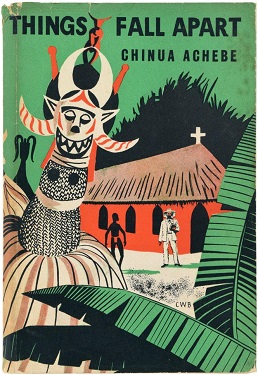
Things Fall Apart is the debut novel of Nigerian author Chinua Achebe first published in 1958. It depicts the events of pre-colonial life in Igboland and the subsequent appearance of European missionaries and colonial forces in the late 19th century. It is seen as an archetypal modern African novel in English, and one of the first novels to receive global critical acclaim. It is a staple book in schools throughout Africa and is widely studied in English-speaking countries around the world. The novel was first published in the United Kingdom in 1958 by William Heinemann Ltd and became the first work published in Heinemann's African Writers Series.
A winged unicorn is a fictional ungulate, typically portrayed as a horse, with wings like Pegasus and the horn of a unicorn. In some literature and media, it has been referred to as an alicorn, a word derived from the Italian word alicorno, or as a pegacorn, a portmanteau of pegasus and unicorn.
The Countess Kathleen and Various Legends and Lyrics (1892) is the second poetry collection of W. B. Yeats.
The Tower is a book of poems by W. B. Yeats, published in 1928. The Tower was Yeats's first major collection as Nobel Laureate after receiving the Nobel Prize in 1923. It is considered to be one of the poet's most influential volumes and was well received by the public.

Slouching Towards Bethlehem is a 1968 collection of essays by Joan Didion that mainly describes her experiences in California during the 1960s. It takes its title from the poem "The Second Coming" by W. B. Yeats. The contents of this book are reprinted in Didion's We Tell Ourselves Stories in Order to Live: Collected Nonfiction (2006).

"The Stolen Child" is an 1889 poem by William Butler Yeats, published in The Wanderings of Oisin and Other Poems.
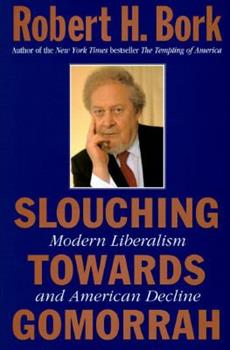
Slouching Towards Gomorrah: Modern Liberalism and American Decline is a 1996 non-fiction book by Robert H. Bork, a former United States Court of Appeals judge. Bork's thesis in the book is that U.S. and more generally Western culture is in a state of decline and that the cause of this decline is modern liberalism and the rise of the New Left. Specifically, he attacks modern liberalism for what he describes as its dual emphases on radical egalitarianism and radical individualism. The title of the book is a play on the last couplet of W. B. Yeats's poem "The Second Coming": "And what rough beast, its hour come round at last, / Slouches towards Bethlehem to be born?" Bork contends that the "rough beast of decadence … now sends us slouching towards our new home, not Bethlehem but Gomorrah." More directly, the title borrows from Joan Didion's Slouching Towards Bethlehem.
"Slouching Toward Bethlehem" is episode 4 of season 4 in the television show Angel. Its title derives from a line from the W. B. Yeats poem "The Second Coming".
"Sailing to Byzantium" is a poem by William Butler Yeats, first published in the 1927 reprint of Stories of Red Hanrahan and the Secret Rose, and then in the 1928 collection The Tower. It comprises four stanzas in ottava rima, each made up of eight lines of iambic pentameter. It uses a journey to Byzantium (Constantinople) as a metaphor for a spiritual journey. Yeats explores his thoughts and musings on how immortality, art, and the human spirit may converge. Through the use of various poetic techniques, Yeats's "Sailing to Byzantium" describes the metaphorical journey of a man pursuing his own vision of eternal life as well as his conception of paradise.
"An Irish Airman Foresees His Death" is a poem by Irish poet William Butler Yeats (1865–1939), written in 1918 and first published in the Macmillan edition of The Wild Swans at Coole in 1919. The poem is a soliloquy given by an aviator in the First World War in which the narrator describes the circumstances surrounding his imminent death. The poem is a work that discusses the role of Irish soldiers fighting for the United Kingdom during a time when they were trying to establish independence for Ireland. Wishing to show restraint from publishing political poems during the height of the war, Yeats withheld publication of the poem until after the conflict had ended.
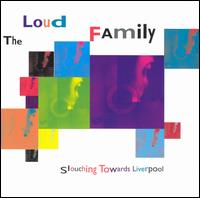
Slouching Towards Liverpool is an EP that includes live performances of songs from The Loud Family's first album, Plants and Birds and Rocks and Things, as well as some live studio tracks recorded at WNUR-FM in Evanston, Illinois.
"The Lake Isle of Innisfree" is a twelve-line poem comprising three quatrains, written by William Butler Yeats in 1888 and first published in the National Observer in 1890. It was reprinted in The Countess Kathleen and Various Legends and Lyrics in 1892 and as an illustrated Cuala Press Broadside in 1932.
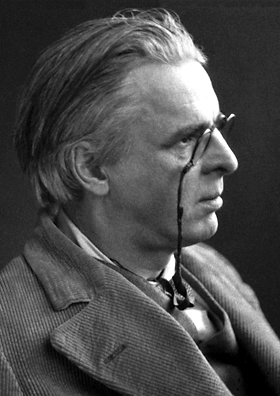
"The Circus Animals' Desertion" is a poem by William Butler Yeats published in Last Poems in 1939. While the original composition date of the poem is unknown, it was probably written between November 1937 and September 1938. In the preface, Yeats suggests that he intended the poem to combine his personal views and impressions with the customs and beliefs of Christian Ireland. The poem was the last work published in Yeats's final collection, with "Politics" following as an envoi. In the poem, the poet uses the desertion of circus animals as an analogy to describe his failure to find inspiration for poetic creation as he seeks for new inspiration. Critics have detected aspects of both Modernism and Postmodern literature in the poem.
The Widening Gyre may refer to the first line of the poem by Irish poet W. B. Yeats "The Second Coming".
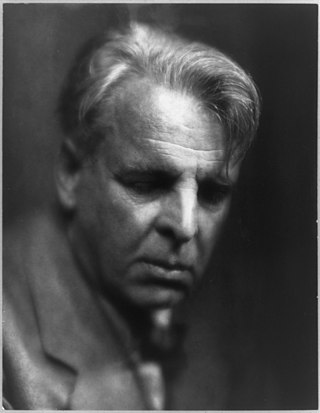
Blood and the Moon is a poem by Irish poet William Butler Yeats written in 1927. It was first published in the Spring 1928 issue of The Exile and then in the collection The Winding Stair in 1929, before being reprinted in The Winding Stair and Other Poems in 1933. Yeats composed the poem in response to the 1927 assassination of Kevin O'Higgins, the Vice-President of the Free State, whom Yeats had known personally. The poem contains many themes common in Yeats's poems from the 1920s including the "tower", a reference to Thoor Ballylee, which had been the title of a collection of works printed the year before "Blood and the Moon" was published, as well as the "gyre" which had been a major focus of his 1920 poem "The Second Coming".

The Widening Gyre is a 1983 novel by Robert B. Parker, featuring his private detective character Spenser. The title comes from the first line of W. B. Yeats poem "The Second Coming".
Slouching Towards Bethlehem is a 1968 collection of essays by Joan Didion and mainly describes her experiences in California during the 1960s.
"Slouching Towards Bethlehem" is the eighth episode of the second season of the American science fiction series Defiance, and the series' twentieth episode overall. It was aired on August 7, 2014. The episode was written by Bryan Q. Miller and directed by Larry Shaw.









